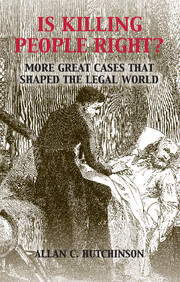Book contents
- Frontmatter
- Dedication
- Contents
- List of figures
- Preface
- 1 Introduction: on the road (again)
- 2 Is killing people right?: law and the end of life
- 3 Oil on troubled waters: the consequences of civil liability
- 4 The politics of law: cats, pigeons and old chestnuts
- 5 The companies we keep: the moralities of business
- 6 Fifty shades of Brown: consent and the criminal law
- 7 Putting up a defence: sex, murder and videotapes
- 8 Wade-ing into controversy: a case of accidental activism
- 9 Playing a different tune: fairness in deal making
- 10 Conclusion: surfing the tides
- Sources
- Index
- References
10 - Conclusion: surfing the tides
Published online by Cambridge University Press: 05 May 2016
- Frontmatter
- Dedication
- Contents
- List of figures
- Preface
- 1 Introduction: on the road (again)
- 2 Is killing people right?: law and the end of life
- 3 Oil on troubled waters: the consequences of civil liability
- 4 The politics of law: cats, pigeons and old chestnuts
- 5 The companies we keep: the moralities of business
- 6 Fifty shades of Brown: consent and the criminal law
- 7 Putting up a defence: sex, murder and videotapes
- 8 Wade-ing into controversy: a case of accidental activism
- 9 Playing a different tune: fairness in deal making
- 10 Conclusion: surfing the tides
- Sources
- Index
- References
Summary
As all these great cases attest, the development of the common law is a game of chance. It is difficult to predict their when, where and why. They sometimes appear from nowhere or, at least, the most unlikely of circumstances. But they go on, for whatever reason, to have a momentous effect on the future orientation and development of the law. Some stand the test of time and the effects of future tinkering; others have lead a charmed if relatively short life and are replaced by a new case on the block. The common law manages to survive and perhaps strengthen itself by these both fatal and life-affirming acts of transformation.
Efforts to explain the dynamics and drama of change are manifold. A variety of metaphors have been used to demonstrate that not only is change inevitable, but also that such change is manageable and limited. A favourite one goes back to the infamous Edwards case in 1929, when Lord Sankey of the Privy Council chastised the Supreme Court of Canada for its unwillingness to interpret ‘persons’ as including women, whatever the meaning of the term on its enactment fifty years earlier. In a delightful phrase, he compared the Constitution to ‘a living tree capable of growth and expansion within its natural limits’. This metaphor has been applied generally to the common law at large. Recently, the Supreme Court of Canada has itself insisted that law is ‘a living tree which, by way of progressive interpretation, accommodates and addresses the realities of modern life’.
While this metaphor does much to inform a more beneficial way of thinking about the common law, it is too narrow and restrictive in its reach. On the plus side, it makes clear that the law is organic, not ossified; it must develop and change if it is to flourish, not wither. This is no small acknowledgement that has managed to wrest the common law from the stranglehold of a more conservative and less expansive vision of law and law making. However, on the negative side, it unduly constricts the imagination. First, it depicts the common law as one organic entity, a tree. This misrepresents the fact that, as the history of great cases shows, the law can be one thing one day (e.g., a tree) and another thing another day (e.g., a bear).
- Type
- Chapter
- Information
- Is Killing People Right?More Great Cases that Shaped the Legal World, pp. 148 - 152Publisher: Cambridge University PressPrint publication year: 2016



